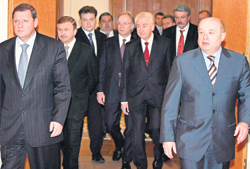
|
Rise of Russia and Europe's energy problems January seems to be the cruellest month for energy-dependent European nations. Last year Russia and the Ukraine were involved in a long spat over the supply of Russian gas to the Ukraine and the transport of gas to Europe through the Ukraine. This year it is the turn of Belarus, once part of the now defunct Soviet Union. Though the Russo-Belarus dispute over oil supplies has now been settled-for the moment at least- these disputes involving Russia, one of the world's largest suppliers of oil and gas, has exposed Europe's vulnerability on the vital issue of energy.
Several European Union economies, particularly Germany, are dependent on regular energy supplies from Russia. It means that Russia could make energy supplies a political weapon to win influence and respect from the Nato members and that is precisely what it is doing while warning its former Soviet Union partners not to stray from Moscow's political orbit. If Russian pressure one year ago set the European Union to search for ways to reach a common energy policy in order to minimise dependence, the European Commission's report announced last week has now created a dispute within the 27-nation organisation. The main opposition to the EC's plans which aim at dismantling the continent's massive energy monopolies comes from France and Germany. They have indicated they would fight against the EC's proposal that would pose a major challenge to those huge firms such as Electricite de France and Germany's E.On. On January 1 last year at the height of the European winter, Russia stopped gas supplies to the Ukraine which is the world's sixth largest consumer of natural gas and resumed it three days later after an initial settlement. A similar scene was repeated this month when Belarus and Russia were involved in a dispute, this time over the price of Russian oil to the former Soviet republic and through it to Europe. Russia cut oil supplies to Belarus accusing it of siphoning off oil meant for some other European states including Germany and Poland. Even though the issue has been settled for the moment, both these conflicts in the height of winter which affected other states in Europe dependent on Russian supplies, are illustrative of a resurgent Moscow flexing its economic muscle to reassert its place on the world stage. Russia under President Vladimir Putin has tried to win back what was once Moscow's prominent role in international affairs. Naturally it no longer enjoys the super power status it once did. Had the Soviet Union survived and Putin was at the helm of affairs, it is not too difficult to imagine the direction in which he would have taken the country. Though his military resources are now depleted and does not pose the kind of threat to the west it once did, Putin is concerned with the growing nexus between the west as exemplified by Nato and the European Union and former Soviet bloc states or Soviet Union territories. More than ten years after the first cracks appeared in the monolithic Soviet empire, four of its former member states joined Nato, the western military alliance. Now Nato has moved farther east absorbing more of the former empire- Bulgaria, Estonia, Latvia, Lithuania, Romania, Slovakia and Slovenia. The next in line are the Ukraine and Georgia bringing Nato to Russia's backyard. Naturally Putin views this as a threat to Russia's security and interference in its sphere of influence. When Ukraine voters brought the pro-western Victor Yushchenko to power defeating the pro-Russian candidate, Putin was vivid. Moscow's spat with the Ukraine over gas supplies last year was a counter thrust by the tough Putin trying to warn Yushchenko and the west that the country should not stray too far and that Russia is its natural ally. Putin has partially succeeded in his quest to neutralise Ukraine's drift to the west with the installation of a pro-Moscow prime minister. But the Belarus leader does not have the clout in the west that the Ukraine president has and so it has been easier for Putin to deal with him despite Belarus' attempt to challenge Russian power previously. But the energy problems will not go away because the differences between the European Commission and the two influential European Union's two most powerful continental members has brought the dispute to the heart of Europe. Opposing the Commission's proposal on a break of the energy monopoly, France's industry minister Francois Loos said: "Our system works and the proof of that is that other producers-other than EDF-tell us that it is working to their satisfaction." The German Economy minister Michael Glos said that splitting energy production and transmission, as proposed by the Commission, would be "rather difficult." President of the EC Jose Manuel Barroso has argued that the row between Russia and Belarus over supplies underlined the need for the EU to "develop a common external energy policy and speak with one voice to third countries." But Germany argues that the proposed liberalisation could raise constitutional problems and also that such a move could encourage companies to look at short-term profiteering and not commit themselves to long term investment. Barroso's programme also called on member states to cut carbon emissions by 20 per cent from 1990 levels before 2020, or even 30 per cent if other developed countries agree. Though carbon emission is a major issue as it is recognised in scientific circles as the main contributor to global warming, industrial countries are slow to reduce green house gases while potential economic powers such as China and India which will need more energy are seen major future polluters. If India and China could why not we, seems the argument in some western circles. |
| || Front
Page | News
| Editorial
| Columns
| Sports
| Plus
| Financial
Times | International
| Mirror
| TV
Times | Funday
Times || |
| |
Copyright
2007 Wijeya
Newspapers Ltd.Colombo. Sri Lanka. |
